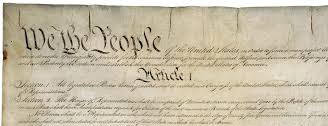According to prevailing case law, it should be remembered, the First Amendment protects the right to express opinions, including the opinion that the government should be overthrown, that violence is sometimes a good way to bring about social change, and even that it would be desirable for the president to be assassinated–as long as the opinion being expressed is sufficiently abstract and vague that it does not amount to trying to incite “imminent lawless action.”
In March of 2016, at a Trump rally in Kentucky, Trump shouted “Get ’em out! Get ’em out!” into the crowd. Right after that, supporters began roughing up the anti-Trump protesters whom he was referring to. Those protesters are now suing Trump and his campaign for inciting violence against them. A federal district court has just refused to dismiss the case. One of the arguments that Trump’s lawyers made was that his words were protected by the First Amendment, but the court ruling says that no they’re not, as they can be viewed as an order for “imminent lawless action.” Please be clear, this is not a decision on the case, merely a decision that the plaintiffs have a case and a refusal on the part of the judge to dismiss it. Here’s that ruling.
Judicial decisions always have long lists of cited precedents. Two of the cases cited in the case as precedents came up in class in the context of Chapter 4, Civil Liberties, in the section on free speech: Brandenberg v. Ohio (1969) and Hess v. Indiana (1973). Both of those cases involved threats of lawless action, but both were sufficiently vague that the Supreme Court decided that the speech was protected under the First Amendment. (In the Brandenberg case, a KKK leader had said that “there might have to be some revengeance taken,” and with Hess, the utterance was “we’ll take the [effing] street again.”
Several other cases involving issues of incitement to riot or threat of lawless action are cited in the case as well. Three cases in particular stand out. In all three of those instances, the parties claiming First Amendment rights were on the winning side, but in all three instances, the court in Kentucky has refused to go along with Trump’s contention that they provide precedents in his favor.
Bible Believers v. Wayne County, Michigan (Sixth Circuit Court of Appeals, 2015): A group of evangelical Christians was walking around the Arab International Festival in Dearborn, Michigan, preaching to Muslims that they would be damned if they did not convert to Christianity. This led to some bottles being thrown at them, and the sheriff’s department intervened only to chase the Bible Believers away, not to arrest anybody for violence against them. Ultimately, the sheriff’s department demanded that the Bible Believers leave the area. The Bible Believers sued. They lost the case at the Federal District Court level, but the Sixth Circuit reversed it, ruling that they were within their First Amendment rights, and that although violence resulted, they were not inciting any riots with their actual words. The fact that others find one’s words provocative does not in itself allow police to take away one’s right to speak (that is known as a “heckler’s veto”). This is one of the precedents that Trump tried unsuccessfully to use in this Kentucky case.
NAACP v. Claiborne Hardware (Supreme Court, 1982): The Court ruled that a black boycott of white businesses as a political protest was constitutionally protected, and that even the words by one of the NAACP leaders, “If we catch any of you going in any of them racist stores, we’re gonna break your damn neck” was protected. But Trump’s court refused to apply that precedent to Trump’s case, because Trump’s words “Get ’em out! Get ’em out!” were a direct command rather than a suggestion that something might happen at some indeterminate time in the future.
Watts v. United States (Supreme Court, 1969): The Court ruled that an 18-year-old man at an anti-Vietnam War rally, expressing an unwillingness to be drafted to fight in Vietnam, was within his First Amendment rights when he said, “If they ever make me carry a rifle the first man I want to get in my sights is LBJ.” They found that this fell short of a threat to assassinate President Johnson and was, rather, an expression of a personal feeling about the president, an opinion. As with the other cases, Trump was not successful in claiming this for a precedent on his side.
Sorry, Trump.



